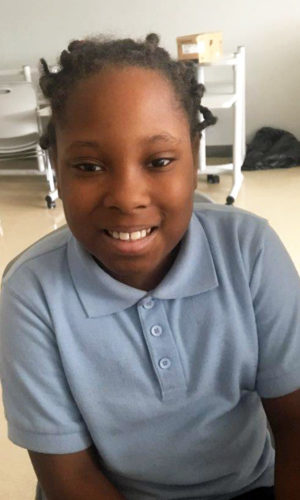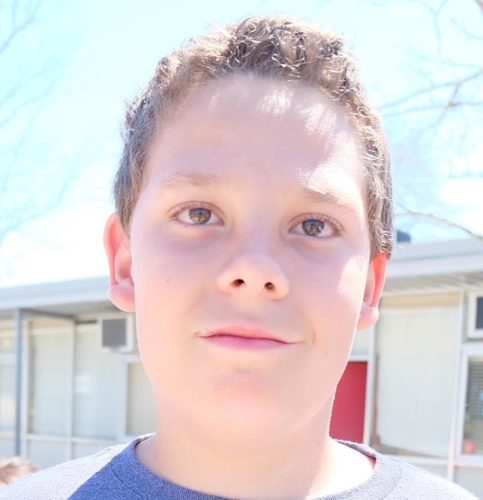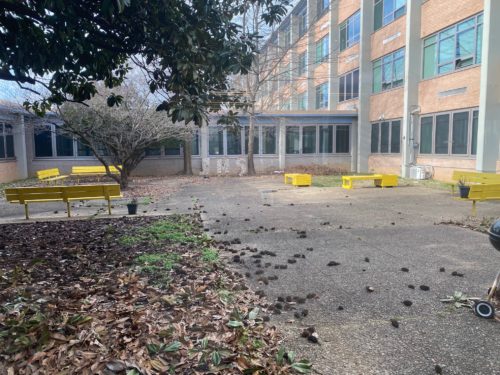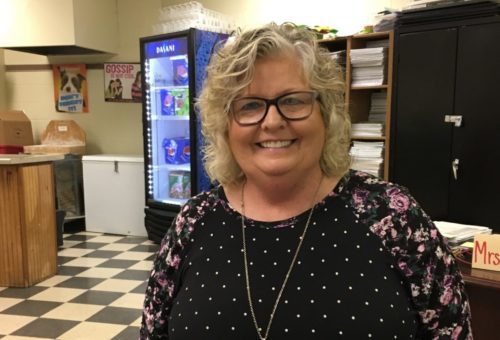Washington D.C. boasts some of the highest rents in the country and is home to many wealthy Americans. Yet, for many families, food security and affordable housing are constant issues. In areas where our affiliated project is located, there are often more convenience stores than grocery stores with healthy food items. In terms of housing, rent in D.C. tends to be higher than the national average. A family is considered rent overburdened when they pay more than 30% of their gross income on rent, and 46% of the households that rent are overburdened in Washington. For these reasons, support from Children Incorporated, and our sponsors, is crucial to children living in poverty.
Our partner in D.C.
In Washington, D.C., Children Incorporated is affiliated with an outstanding implementing partner, Communities In Schools (CIS).
“CIS is a national organization whose focus is building relationships that empower at-risk students to stay in school and become achievers, not just academically but also in life,” explains our Director of U.S. Programs, Renée Kube.
“CIS is a national organization whose focus is building relationships that empower at-risk students to stay in school and become achievers, not just academically but also in life,” explains our Director of U.S. Programs, Renée Kube.
“The Communities In School’s mission is complementary to our mission, and our collaboration has been a natural and successful fit. The CIS site coordinators around the United States serve as Children Incorporated’s volunteer coordinators.”
“Our coordinators in D.C. often tell me about how the support is greatly needed and valued by the students and administrators, and in fact, all of our programs — sponsorship, Hope In Action, and our Higher Education Fund — are making a difference in the lives of the children and their families in our nation’s capital,” said Renée.
“Starting in the 2019-2020 School Year, Communities In Schools of our Nation’s Capital has worked with D.C. Public Schools in an initiative called ‘Connected Schools.’ This is based on an effective program in Philadelphia. The goal is to accelerate better outcomes for students who are furthest from opportunities. Ten schools were identified to become Resource Hubs in their communities to meet the students’ and families’ needs both inside and outside the classroom.”
“There is better recognition by DCPS that academic success and student well-being do not happen in a vacuum. Students who are homeless and hungry will not spend much time studying their spelling words or times tables. This is obviously what Children Incorporated is all about, too, and our partnership is truly appreciated in this new, greater effort,” said Renée.
Visiting Cardozo
As a part of their yearly visits to meet with our volunteer coordinators, Renée, along with U.S. Sponsorship Specialist Shelley Oxenham, visited the Cardozo Education Campus — one of four of our affiliated projects in Washington D.C.
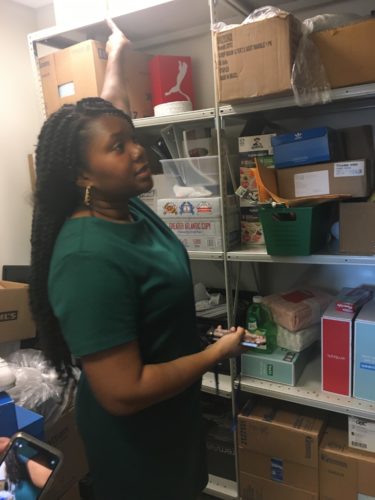
Monique show Renée and Shelley her supply closet where she keeps items for our sponsored children.
“We were warmly escorted to the school by the Communities In Schools Director of Programs & Data, Sully Washington. Sully told us how much she values the partnership with Children Incorporated, which has meant so much to the students,” said Renée.
“Cardozo is located in the Columbia Heights neighborhood of Ward 1. The building is an old, historic high school building. It houses a regular 6th — 12th-grade school and a parallel International Academy for the large population of English language learners.”
“This school is the most diverse of our D.C. sites. Its 746 students are 51% Hispanic/Latino, 46% black, 2% Asian, and 1% white. A very high 44% are English language learners. A sobering 100% come from economically disadvantaged households. It’s also interesting that only 37% come from within the neighborhood. The other 63% come from outside the boundary,” explained Renée.
As they continued their meeting, Renée could tell that through Sully’s description of his work, the school’s officials were committed to helping the children in any way they could. Sully explained to Renée and Shelley that in addition to the International Academy, there is also a 9th Grade Academy to aid the transition to high school, and a STEM Academy. The school offers AP classes, a night school for credit recovery, Air Force JROTC, indoor and outdoor sports, and numerous arts and cultural clubs.
Meeting our coordinators
After their meeting, Sully introduced Shelley and Renee to the Communities in Schools Team, who all work together to support our sponsored children in D.C.: Monique, Diogenes, and Fabi.
“We had a great conversation with the CIS coordinators. They shared that a lot of the kids need help with their education. Nearby Howard University has provided tutors for after-school efforts. They also told us that the mix of students’ backgrounds has sometimes collided into misunderstandings, tensions, arguments, and fights. Due to this, Cardozo’s principal instituted a unity program called ‘One Cardozo,’ with a variety of activities and mediations to help. Our coordinators said things have gotten much better in this regard,” said Renée.
“For all of our sponsored children, homeless or not, Children Incorporated’s goal is to provide funds to help with materials and supplies that support their health, well-being, and education, so they stay in school, achieve their diplomas, and have hope for a brighter future,” said Renée.
“Monique, Dio, and Fabi shared that the students have many personal challenges that often mean their studies get put on the back burner. There is a high percentage of homeless students. They bounce from sleeping at shelters, to couch surfing at friends’ houses, to staying for a night here and there with a relative. Some have slept in cars for weeks at a time. Some are with a parent, and some, sadly, are all by themselves. It is hard for them to keep up with their clothes and meager personal possessions, which they must usually store in trash bags. They cannot leave these items behind at the shelter.”
“For all of our sponsored children, homeless or not, Children Incorporated’s goal is to provide funds to help with materials and supplies that support their health, well-being, and education, so they stay in school, achieve their diplomas, and have hope for a brighter future,” said Renée.
“Sponsorship and Hope In Action Program funds that our organization provides goes towards providing food, hygiene supplies, air mattresses and bedding, and laundry detergent. The kids are very embarrassed when their uniforms are no longer clean, and the laundry aid helps them feel neat and proud of their appearance and supports their regular attendance in school.”
***
How do I sponsor a child in Washington, D.C.?
You can sponsor a child in Washington, D.C. in one of three ways: call our office at 1-800-538-5381 and speak with one of our staff members; email us at sponsorship@children-inc.org; or go online to our sponsorship portal, create an account, and search for a child in Washington D.C. that is available for sponsorship.
SPONSOR A CHILD

